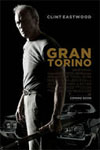The
Curious Case of Benjamin Button
Fantastic Mr. Fox
Gran Torino
Harry Potter and the Half Blood Prince
The Hurt Locker
The
Informant!
Julie and Julia
Milk
The Reader
Serious Man
Film Reviews from 2008
Film
Reviews from 2007
Film Reviews
from 2006
Clint Eastwood continues to amaze me. Well into his 70’s, he’s making thoughtful movies about such basic Catholic themes as conversion, sacrifice, and redemption. His recent films include some of the best films of the decade: Mystic River, Million Dollar Baby, Letters from Iwo Jima, and now Gran Torino. Clint’s Westerns and Dirty Harry movies of the 1960’s, 70’s and 80’s did not interest me at that time. Now he is redeeming his own iconic character. In the climactic scene of Gran Torino, Clint, as Walt Kowalski, confronts a gang out of a scene from High Plains Drifter or even Dirty Harry. Then he pulls the rug out from under us all. I’m also amazed at how Catholic Gran Torino is. The movie begins and ends with Catholic funerals. After the death of Walt’s wife, Dorothy, Fr. Janovich, a well-meaning but naïve young priest, continues to visit Walt, wanting him to receive the sacrament of reconciliation, claiming this was Dorothy’s final wish. The scenes between Walt and Janovich could actually be studied in Introduction to Pastoral Care. Janovich is persistent, yet arrogant and presumptuous, calling Walt, a man who is old enough to be his grandfather, by his first name. However, both Walt and Janovich grow in respect for one another from the relationship.
It’s rare that a movie character experiences change in an authentic way. Most are either unrepentant villains or larger than life heroes. Walt’s conversion is well thought out in Nick Schenk’s screenplay. He’s still the same man, but he has changed in his worldview. Even if this is not Clint’s best performance (he overdoes the “old codger” character), he is still effective as a man struggling with inner and outer change. The strong climax makes good sense, considering the character and situation. Walt seeks forgiveness from the church and the world, and moves on toward an act of sacrificial redemption. Believe it or not, Walt becomes a Christ figure. Gran Torino is not quite at the same level of Clint’s poignant masterpiece, Million Dollar Baby. But it’s still well worth seeing. And it’s touching people, especially men, at a deep level. It resonates with male spirituality, with its strong themes of mentoring and sacrifice. I appreciate the way that Walt wrestles with such great Catholic themes of guilt, reconciliation, and redemption. The language is pretty rough at times, including racial slurs, but they are appropriate within the context. I can’t wait until Gran Torino is available on DVD so I can add it to my list of Catholic movies. Tom Condon, OP |
The USCCB Office for Film & Broadcasting
classification is L -- limited adult audience, films whose problematic
content many adults would find troubling. The Motion Picture Association
of America rating is R -- restricted. Under 17 requires accompanying
parent or adult guardian. |



 Gran Torino
Gran Torino As with Clint’s character in Million Dollar Baby, Walt
carries scars from his past (he does indeed need to be forgiven) and
has a strained relationship with his adult children. After Dorothy’s
death, Walt moves from a racist attitude toward the Hmong family which
has moved next door, to a surprisingly tender one. Walt catches
young Thao, under the influence of a gang, trying to steal his prized
1972 Gran Torino. The Hmong family insists that Thao work for Walt
in order to pay off his debt. At first, Walt wants nothing to do
with this, but begrudgingly accepts Thao. Eventually, he develops
a mentoring relationship to the fatherless boy, gradually seeing the
good qualities in him. Walt tries to save him from the gang and
find him a job. Walt also becomes protective of Sue, Thao’s
older sister, shielding her from street youths who hassle and threaten
her.
As with Clint’s character in Million Dollar Baby, Walt
carries scars from his past (he does indeed need to be forgiven) and
has a strained relationship with his adult children. After Dorothy’s
death, Walt moves from a racist attitude toward the Hmong family which
has moved next door, to a surprisingly tender one. Walt catches
young Thao, under the influence of a gang, trying to steal his prized
1972 Gran Torino. The Hmong family insists that Thao work for Walt
in order to pay off his debt. At first, Walt wants nothing to do
with this, but begrudgingly accepts Thao. Eventually, he develops
a mentoring relationship to the fatherless boy, gradually seeing the
good qualities in him. Walt tries to save him from the gang and
find him a job. Walt also becomes protective of Sue, Thao’s
older sister, shielding her from street youths who hassle and threaten
her.